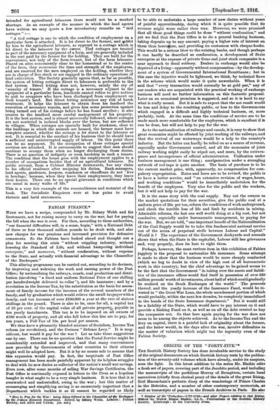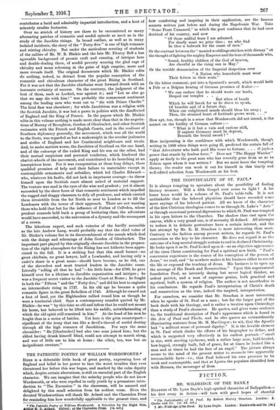ORIGINS OF " FORTY-1
Tan Scottish History Society has done invaluable service to the study of the original documents on which Scottish history rests by the publica- tion of the seventy-odd- volumes which have already, under its auspices, seen the light. In this latest addition to the series Mr. Blaikie edits a fresh set of papers, covering part of the Jacobite period, and including the manuscripts of the perfidious Murray of Broughton, certain local narratives (chiefly from clerical pens) of the details of the great Rising, Neil Maceachain'a pathetic diary of the wanderings of Prince Charles in the Hebrides, and a number of other contemporary memorials, as well as transcripts of papers in the French Archives in Paris. He also
• Origin* of the *Forty-five-1117-1746--and other Papers relating to that Rising. -Fated by Waiter Biggar Blaikie, LLD. .Pubileations of the Scottish History Society. Edinburgh: at the University Press.
contributes a lucid and admirably impartial introduction, and a host of minutely erudite footnotes.
Over no stretch of history are there to be encountered so many alternating patches of romantic and sordid episode as meet us in the study of the Jacobite risings. In broad outline, as well as in many isolated incidents, the story of the " Forty-five " is one of high romance and stirring chivalry. But under the meticulous scrutiny of students of the calibre of Mr. W. B. Blaikie and the late Mr. Fitzroy Bell a less agreeable background of prosaic craft and cunning, of intrigue here and double-dealing there, of sordid poverty wearing the glad rags of chivalry and mean scheming in the guise of high emprise, more and more reveals itself. The original documents which Mr. Blaikie edits do nothing, indeed, to detract from the popular conception of the romantic and chivalrous character of the great Rising in Scotland. For it was not that the Jacobite chieftains went forward drunk with an insensate certainty of success: On the contrary, the judgment of the best of them, such as Lochiel, was against it ; and "Let us also go that we may die with him !" was probably the commonest sentiment among the leading men who went out to " die with Prince Charlie." The fatal flaw was elsewhere ; for while Jacobitism was a religion with the Scottish Jacobite, it was but a pawn in politics with the disaffected of England and the King of France. In the papers which Mr. Blaikie edits in this volume nothing is made more clear than that in the negotia- tions of Murray of Broughton, Gordon of Glenbucket, and other Scottish emissaries with the French and English Courts, and in the anilines of Southern diplomacy generally, the movement, which was all the world to the Scots, was regarded as but a makeweight in the secular jealousies and strifes of England and her Continental neighbours and rivals. And, to make matters worse, the Jacobites of Scotland on the one hand, and of the entourage of the exiled King and his son on the other, had their mutual suspicions and personal vendettas, which hindered the chariot-wheels of the movement, and contributed to its launching at an inauspicious hour. For it was exasperation at these long delays, these qualified promises of help and their failure to materialize except in contemptible armaments and subsidies, which led Charles Edward— who, whatever his faults, did not lack in impetuous courage—to throw himself upon the Scottish coast almost naked of material support. The venture was mad in the eyes of the wise and prudent ; yet it almost succeeded by the sheer force of that romantic sentiment which impelled the rugged and shaggy clansmen to defy all prudence, and which carried them irresistible from the far North so near to London as to fill the Londoners with the terror of their approach. There are not wanting those who hold that but for the influence of Forbes of Culloden, whose prudent counsels held back a group of hesitating clans, the adventure would have succeeded, to the subversion of a dynasty and the reconquest of a crown.
The laborious expert, and such votaries of the hardly accessible as the late Andrew Lang, would probably say that the chief value of Mr. Blaikie's volume lies in its disentombment of the annals which deal with the doings and schemings of John Gordon of Glenbucket. The important part played by this originally obscure Jacobite in the prepara- tion of the right atmosphere for the Rising has not hitherto been appre- ciated to the full. It is a striking fact that this small farmer—no great chieftain, no great lawyer, half a Lowlander, and having only a cadet's share in a great name—should have become, as he did, one of the shrewdest and most trusted leaders in the Jacobite cause. Literally "selling all that he had "—his little farm—for £700, he gave himself over for a lifetime to Jacobite organization and intrigue ; he was a frequent secret visitor to the Jacobite Court at Rome ; he fought in both the " Fifteen " and the " Forty-five," and did his best to engineer an intermediate rising in 1737. In his old age he became a quite romantic figure in the great Rebellion of 1745. Although he owned not a foot of land, yet the Highlanders rallied round him as though he were a territorial chief. Says a contemporary annalist quoted by Mr. Blaikie—he was " by this time so old and infirm that he could not mount his horse, but behoved to be lifted into his saddle, notwithstanding of which the old spirit still remained in him." At the head of his men he fought thus in a series of battles. Yet here is the grim counterpart— significant of the irony that ran like a devil's-thread of sordid destiny through all the high romance of Jacobitism. For says the same chronicler : "He [Glenbucket] had also two sons joined him; but the eldest having drunk himself blind, could not attempt to march along, and was of little use to him at home : the other, too, was but an insignificant creature."































 Previous page
Previous page